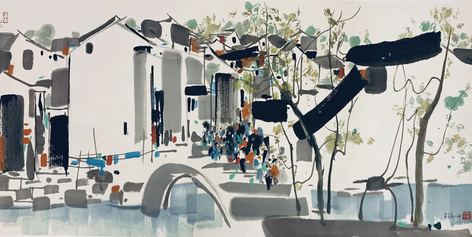 A Small Town in the South of the Yangtze, by Wu Guanzhong, 1982
A Small Town in the South of the Yangtze, by Wu Guanzhong, 1982
Chinese Heiress: Why Women Own Less and How They Rebel
In the traditional Confucian patriarchal kinship system, women were rarely considered heirs of their families. The practices of patrilineality, a kinship system in which an individual’s family membership derives from and is recorded through the male line, and patrilocality, a social institution in which a couple resides with the husband’s family, positioned women in a subordinate position within the family and kinship system, excluding them from inheriting the majority of family wealth. Despite dramatic social changes during the past century, practices such as patrilocal marriages and the patrilineal inheritance of lineages have survived the various political and economic regimes in China. As a consequence, Chinese women to date continue to be disadvantaged in wealth and inheritance due to patriarchal social norms. The post-socialist economic transition, accompanied by the retreat of the state, has resulted in a further revival of patriarchal practices and the deterioration of women's status.
In this book project, I aim to investigate the challenges and reactions of contemporary Chinese women to the unequal rights of inheritance and their unequal roles within the kinship system. I explore the causes of gender wealth gap and how women renegotiate social norms in the fight for their own interests. Methodologically, I employ both quantitative and qualitative approaches to collect data and perform empirical analysis.
In the traditional Confucian patriarchal kinship system, women were rarely considered heirs of their families. The practices of patrilineality, a kinship system in which an individual’s family membership derives from and is recorded through the male line, and patrilocality, a social institution in which a couple resides with the husband’s family, positioned women in a subordinate position within the family and kinship system, excluding them from inheriting the majority of family wealth. Despite dramatic social changes during the past century, practices such as patrilocal marriages and the patrilineal inheritance of lineages have survived the various political and economic regimes in China. As a consequence, Chinese women to date continue to be disadvantaged in wealth and inheritance due to patriarchal social norms. The post-socialist economic transition, accompanied by the retreat of the state, has resulted in a further revival of patriarchal practices and the deterioration of women's status.
In this book project, I aim to investigate the challenges and reactions of contemporary Chinese women to the unequal rights of inheritance and their unequal roles within the kinship system. I explore the causes of gender wealth gap and how women renegotiate social norms in the fight for their own interests. Methodologically, I employ both quantitative and qualitative approaches to collect data and perform empirical analysis.